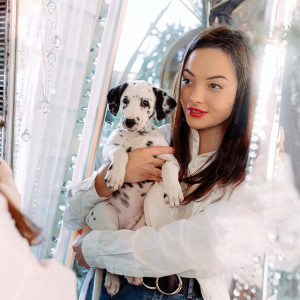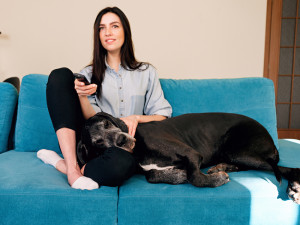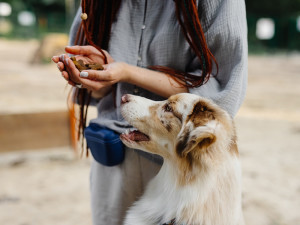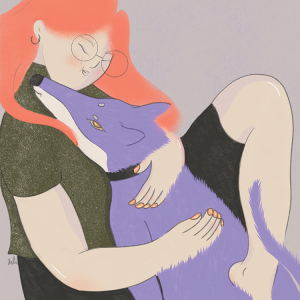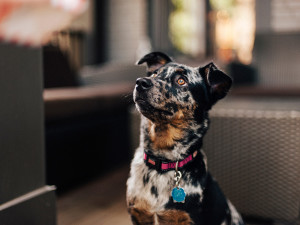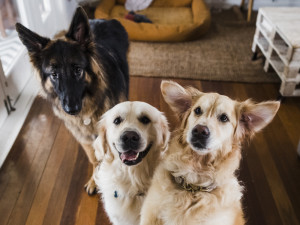Do Dogs and Cats Care What They Look Like?
They do seem to act different after a trip to the groomer, right?

Share Article
Do you ever look at your dog after a trip to the groomer and think they’re standing a little bit taller? Acting a little bit more regal? Or just generally strutting their stuff? Of course you do. Because they are, right? They look good, and they know it. And you know this to be true because you’ve seen them when they get a bad haircut — the way their body language changes and how they seem to hang their head in shame. Dogs (and cats — but we’ll get to them later) definitely care what they look like. It’s obvious.
Uh, not so much, according to dog expert Christina Shusterich, owner of NY Clever K9 Incopens in new tab. “Studies show dogs are not able to visually recognize themselves in a mirror,” she says.
Without that ability, it is impossible for them to know what they look like, let alone judge it as either good or bad, beautiful or ugly. And even if they were able to make such judgements, who’s to say their assessments would align with ours?
As Shusterich points out, “even among humans, there isn’t a consistent, objective, or proven standard of what is considered ‘beautiful’ and what is ‘ugly.’ And dogs are not humans. They don’t think the same way we do. And while they do experience some emotions, studies support the idea that dogs’ emotionality is more limited — similar to that of a two-year-old child — and while dogs feel joy, fear, aggression, affection and even love, they do not feel guilt, shame, pride, or contempt.”

Robert Haussmann, certified dog trainer, canine behavior consultant, and co-founder of Dogboy NYCopens in new tab confirms this: “Even if dogs did experience pride or recognize beauty, they would have a completely different metric for measuring those things than we do. And dogs are much more scent-oriented anyway. If one dog is ‘attracted’ to another dog, they are more likely responding to that dog’s scent and their own biological urges than the way that dog looks.”
But your dog knows when they’re looking spiffy, right?
But you’ve seen the way your dog acts when they exit the groomer with a fresh cut. They’re excited. Don’t they know how perfect they look?
“That excitement likely isn’t because they look good,” says Haussmann. “But because A) they are happy the experience is over, or B) they feel better after being combed out and having their fur trimmed.”
“Pent-up stress from being groomed is often released through hyperactive or playful behavior, which can be misunderstood by humans and anthropomorphized as ‘showing off, which is not something dogs actually do.”
It’s also possible that your dog is not responding so much to their new do as they are to your reaction to it. “Studies have shown dogs are able to read and understand human body language, including postures, movements, tone of voice, smells, and even facial expressions like smiles and frowns,” Shusterich says. “They’ve even shown that dogs are able to feel empathy and reciprocate feelings of love, joy, sadness, and aggression.”
So, if you think your dog looks good, and you are showing them you are happy, they will likely feel happy, too. If you think they look less-than-impressive and are showing them that you are upset, they will likely respond to those feelings. “Dogs do not know they have a ‘bad haircut’,” Shusterich says.
“If your dog seems sad after leaving the groomer, it may just be about the smell,” Haussmann says. “Dogs have very sensitive noses and may not like whatever fragrance is on them. It’s also possible that after being shaved or combed, they may have some sore spots and want to avoid being touched. Or, if the experience was a traumatic one, it may just take a little time for the cortisol to wear off.”
OK, so dogs don’t care what they look like, but what about cats?
“We have no evidence to indicate that cats care about their appearance,” says Joey Lusvardiopens in new tab, certified cat behavior consultant at Class Act Catsopens in new tab in Minneapolis. “Most of why we care about our appearance is related to social pressure, and cats don’t experience that type of pressure from other cats.”
Lusvardi adds that “cats don’t have the cognitive capacity” to comprehend or judge their own appearance the same way humans do. He continues: “We also don’t think that cats understand the concept of mirrors so it’s hard to be as obsessed with appearances as we are without having the ability to look at themselves.”
But what about those videos of cats who have been given lion cuts and look so abashed, even more so than dogs? “Cats do not have the cognitive capacity to experience embarrassment,” Lusvardi adds. “The cat is probably responding to the humans involved. Most likely, the humans are behaving strangely, and the cat isn’t sure what’s going on. The cat is trying to assess if they need to escape or if there is any danger around. The cat also might have just had a stressful grooming experience or gotten out of a carrier. The cat may be stressed and trying to figure out how they can get somewhere that they feel safer.”
This doesn’t mean that cats, like dogs, cannot enjoy the benefits of being well groomed. Matted fur can be extremely uncomfortable for cats and can damage their skin, leading to infections and other health issues, so it’s important to help them maintain their coats, even if the only one who appreciates the visual appeal of their full fluffy glory is you.
And, of course, the best thing about cats and dogs not caring how they look is that they don’t care how you look, either. So, feel free to skip that shower today, if they’re the only one you’re seeing. They literally don’t care if your hair looks like a bird’s nest; they just want you to feed them.

Charles Manning
Charles Manning is an actor and writer based in New York City. In his free time he likes to cook, go swimming at the public pool, volunteer at the LGBTQ senior center, and foster senior and special-needs cats. His work has previously appeared in Cosmopolitan, Elle, Marie Claire, Harper’s Bazaar, Seventeen, and Nylon.
Related articles
![a dog looking at a person holding multiple treats]()
So Apparently, Your Dog Might Be Able to Count
This study finds that dogs can process numbers in a similar fashion to their humans.
![Brown, half breed dog sitting on a chair next to his owner, a blonde stylish woman wearing a brown smart suit.]()
Your Dog Can Read Your Mind, Kind Of
Researchers say dogs actually have a pretty good sense of what we’re thinking.
![Illustration of a woman hugging a dog]()
Your Dog Can Smell When You’re Stressed, New Study Says
Research finds that your pup can smell when you’ve been doom-scrolling, and they get bummed out.
![]()
To Cry Is Human—and Apparently Canine
Time to whip out The Notebook for a little doggie movie night.
Do Dogs Understand Our Words?
Say What? A look at the types of words that dogs understand.
![3 dogs posed together in a house]()
Does Your Dog Have a Unique Personality?
Yep, research says your dog is as special and perfect as you tell them they are.
